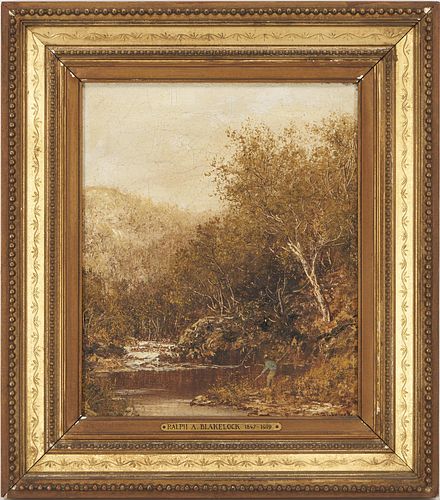Lot 168
Attributed to Ralph Blakelock, O/C Landscape with Figure
Estimate: $3,000 - $3,400
Sold for
$6,000
Sold Price includes BP
Bid Increments
| Price | Bid Increment |
|---|---|
| $0 | $10 |
| $100 | $25 |
| $500 | $50 |
| $1,000 | $100 |
| $3,000 | $200 |
| $5,000 | $500 |
| $10,000 | $1,000 |
| $20,000 | $2,000 |
| $50,000 | $5,000 |
| $100,000 | $10,000 |
Ralph Albert Blakelock (New York/California, 1847-1919) oil on canvas landscape painting depicting a heavily forested area under a hazy sky; a river runs through the center of the work and into the foreground where a figure stands fishing, rendered in a delicate impasto. Signed "Blakelock" lower right. Housed in a giltwood frame with bead course decoration. Sight: 11 1/2" H x 9 1/2" W. Framed: 17" H x 15" W. Biography (courtesy Askart and Michael Zellman, 300 Years of American Art): Ralph Albert Blakelock studied briefly at Cooper Union, and at the Free Academy of the City of New York. In 1867, he first exhibited at the National Academy of Design. Primarily self taught, he declined his wealthy father's offer to pay for more extensive art schooling, and in 1869, embarked on a horseback tour of the West that lasted several years. He lived with Plains Indians, painting pictures of their villages, and traveled and painted through the Rockies and the Sierra Nevadas and in San Francisco and Mexico. His western paintings were in the Hudson River style, although they were rough and more painterly. Returning to New York, he developed what became his signature expression: quiet, moody, nocturnal scenes accented with bright colors depicting light, and trees silhouetted against the sky. He had a labor-intensive technique, which was building up of multiple layers of thick paint, scraping some away, and "adding more to build a complex tonality". (Zellman 420). In 1899, Blakelock had a mental breakdown. He spent the final two decades of his life in a mental institution in New York. It was only in the final few years before his death that collectors began paying substantial sums of money for his work.
The Collection of Karen Wentz, Knoxville, Tennessee.
Overall very good condition with drying cracks resulting in "alligatored" appearance to paint. 2 minute areas of loss in center of work and upper left corner, both less than 1/10" dia. Has not been retouched. See UV light photos for reference. Frame with minor areas of gilt loss.
The Collection of Karen Wentz, Knoxville, Tennessee.
Condition
The UPS Store of Bearden 865-584-0081 (press 5), fax 865-584-0094 store2630@theupsstore.com Click to get a quote
The UPS Store of Northshore Knoxville Contact – Eve 865-951-2499 store6461@theupsstore.com
John & Max Express LLC NOTE: large items & white glove delivery services only (driving range limitations may apply) Contact – Dina 865-230-1568 johnmaxexpress@gmail.com




















